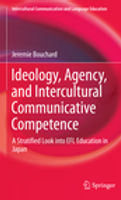

Intercultural Communication and Language Education (Springer)
Editors: Stephanie Ann Houghton, Melina Porto
This book series publishes top quality monographs and edited volumes containing empirical research that prioritises the development of intercultural communicative competence in foreign language education as part of intercultural citizenship. It explores the development of critical cultural awareness broadly aimed at triggering and managing personal and social transformation through intercultural dialogue. Citizenship education and interculturally-oriented language education share an interest in fostering learner exploration, critical analysis and evaluation of other cultures within dynamic socio-political environments. To complement existing research on the development of intercultural communicative competence, this book series explores the techniques, processes and outcomes of intercultural language pedagogy and intercultural citizenship inside and outside the classroom. It also explores the nature, dynamics and impact of intercultural dialogue outside the classroom in real-world settings where various language codes are in use, including World Englishes and English as a Lingua Franca. Further, this book series recognizes and explicitly attempts to overcome wide-ranging real-world barriers to intercultural dialogue and intercultural citizenship. This is especially important in the field of English language education considering the status of English as a global language and associated problems connected to linguistic imperialism, ideology and native-speakerism among others. To promote the development of deeper understandings of how such social problems connect to the use of foreign languages in general, contributions are also sought from disciplines outside foreign language education such as citizenship education, social justice, moral education, language policy and social psychology that shed light upon influential external social factors and internal psychological factors that need to be taken into account.
Please contact
Lawrence Liu (email: Lawrence.Liu@springer.com) for submitting book proposals for this series.
SERIES OVERVIEW
BOOKS IN THIS SERIES

Ideology, Agency and Intercultural Communicative Competence
By Jeremie Bouchard (Series Editors: Stephanie Ann Houghton, Melina Porto)
© 2018 – Springer
Associated with an important epistemological shift from language proficiency to language criticality in applied linguistic research, this book provides a sociological perspective on foreign language education in Japan. By employing ethnographic methods to investigate the relationship between three core analytical elements – foreign language education geared towards the development of learners’ intercultural communicative competence; nihonjinron and native-speakerism as potentially constraining ideological forces; and EFL practices observed at four Japanese junior high schools – the author not only shares valuable insights into how English is taught and learned in a stratum of the Japanese EFL system which has received limited attention from researchers over the years, but also clarifies the fundamental and complex changes currently taking place in the Japanese EFL landscape.
This multi-faceted book also calls for greater consideration in postmodern ideology critique for the stratified nature of social processes as well as the material conditions and underlying generative mechanisms involved in the production and consumption of (including resistance to) ideological discourse. Accordingly, it outlines several challenges shaping ideology research in educational settings, and responds by developing a realist-oriented theoretical and methodological approach to address these challenges. This book serves as a unique point of reference for the study of parallel nationalist discourses embedded in foreign language education systems around the world.

Conceptual Shifts and Contextualized Practices in Education for Glocal Interaction
By Ali Fuad Selvi, Nathanael Rudolph (Editors); Series Editors: Stephanie Ann Houghton, Melina Porto)
© 2018 – Springer
This book employs the realm of English Language Teaching (ELT) as a discursive point of departure to explore how individuals, groups, entities and institutions apprehend, embrace, deal with, manipulate, problematize and resist glocal flows of people, ideas, information, goods, and technology. It apprehends and attends to tensions arising from the fluidly local-global construction and negotiation of borders of identity and interaction within a diverse array of contexts and English education therein. These tensions, whether conceptual or pedagogical, may arise in and through governmental and institutional policymaking, teacher training, or curriculum and materials development, and in the learning experience both within and beyond the classroom, as teachers and students engage with course content and each other.

Towards Post-Native-Speakerism
By Stephanie Ann Houghton, Kayoko Hashimoto (Editors); (Series Editors: Stephanie Ann Houghton, Melina Porto)
© 2018 – Springer
This book probes for a post-native-speakerist future. It explores the nature of (English and Japanese) native-speakerism in the Japanese context, and possible grounds on which language teachers could be employed if native-speakerism is rejected (i.e., what are the language teachers of the future expected to do, and be, in practice?). It reveals the problems presented by the native-speaker model in foreign language education by exploring individual teacher-researcher narratives related to workplace experience and language-based inclusion/exclusion, as well as Japanese native-speakerism in the teaching of Japanese as a foreign language. It then seeks solutions to the problems by examining the concept of post-native-speakerism in relation to multilingual perspectives and globalisation generally, with a specific focus on education.
